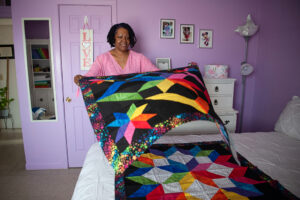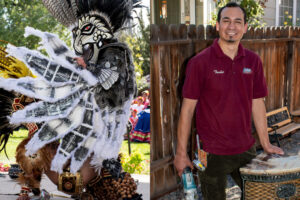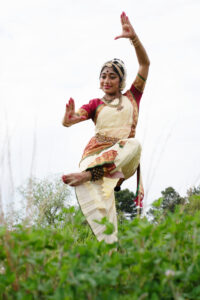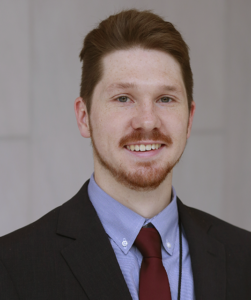April 5, 2023
Mississippi, Nevada, North Carolina: Folk and Traditional Arts
Helping the folk and traditional arts to thrive is an important part of what state arts agencies do. Using a mixture of federal and state funds, state arts agencies provide a wide variety of programs and partnerships that help culture bearers and communities to celebrate, preserve, share and dynamically grow their cherished traditions. Mississippi, Nevada and North Carolina are examples of three state arts agencies that provide a wide range of services to highlight folk and traditional artists and support the communities in which their work is rooted.
Mississippi Arts Commission

Janice Mitchell displays a series of rainbow star quilt tops made during the pandemic. Photo by Rory Doyle, courtesy of Mississippi Arts Commission
The Mississippi Arts Commission works to uplift traditional arts communities through public programming and funding folk arts apprenticeships, fellowships and project grants. The Mississippi Folklife project is a digital journal that features original writing and documentary work on contemporary folklife and cultural heritage practices. Submissions such as interviews, photo essays and films are welcomed within the journal’s three core subjects: music, custom and visual arts. The journal has an impressive catalog and recently focused on how crafting was essential to survival and well-being during the COVID-19 pandemic, with articles on tabletop gaming, quilting, mask making and musicking. (Musicking, according to musician and educator Christopher Small, who coined the term in his 1998 book of the same name, means “to take part, in any capacity, in a musical performance.”) The digital platform also features an Exhibits page, which is home to online exhibits and essay series based on special projects, such as the “Folklife and the Civil Rights Movement in Mississippi” exhibit.
Mississippi also supports traditional arts practitioners and facilitates the transmission of folk and traditional arts knowledge through its annual Folk Arts Apprenticeship grant. The program provides $2,000 to an apprentice and master artist, with at least 80% of the funds reserved to pay the teacher. Both apprentice and teacher must apply together, and preference for awards is given to those who are members of the same community or cultural group to promote the continuation of artwork within its original cultural context.
In addition to the Mississippi Folklife journal and folk arts grants program, the Mississippi Arts Commission also manages the Mississippi Folklife Directory. This directory features updated information on the state’s traditional artists and communities. For more information, contact Mississippi Arts Commission Folk & Traditional Arts Director Maria Zeringue.
Nevada Arts Council

A side-by-side photo of Anastacio Duran with his Eagle Warrior costume and at work, part of the Find your Folklife exhibit. Photo courtesy of Nevada Arts Council
The Nevada Arts Council promotes folk and traditional artists and arts through two folklife grant programs and special exhibits and initiatives.
Folklife Artist grants provide $3,000 in project grant support to folk artists and culture bearers to promote the transmission of community knowledge and practices. Supported projects include apprenticeships, mentoring and group learning activities. Folklife Community grants support small community organizations in presenting and sharing folk and traditional arts. The grant is up to $3,000 and can support festivals, cultural events, concerts and other activities that bring together traditional artists, cultural specialists and the greater community.
The Nevada Arts Council recently completed a three-year document project that explores the diversity of Nevadan community identity and folk and traditional practices. The Find Your Folklife: We Are Folk project photographed Nevadans engaged in the artistic and folkloric practices of their cultural communities juxtaposed with how they present during their “everyday” activities. The exhibit opened at the Nevada State Historical Society Museum last June, coinciding with Reno’s Artown celebration. Following the run at the museum, the exhibit transitioned into the Nevada Touring Initiative (NTI), which booked it into the Eureka Courthouse and then Great Basin College in Elko to kick off its NTI run. To learn more, contact Nevada Arts Council Executive Director Tony Manfredi.
North Carolina Arts Council

Akhila Takkallapalli, a Kuchipudi dancer from Cary, North Carolina. Photo by Will Warasila courtesy of North Carolina Arts Council
The North Carolina Arts Council (NCAC) supports statewide folk and traditional artists and communities through place based apprenticeship grants, recognition programs, and embedding folk and traditional arts within educational opportunities.
In These Mountains Folklife Apprenticeships support 12-month apprenticeships for folk and traditional arts practitioners within the state’s geographically and culturally distinct Appalachian region. The grant facilitates the continued practice of place based folk and traditional arts across 29 Appalachian Regional Commission counties and provides $7,000 for the mentor and $3,000 for the student. Mentors must be part of the community from which their work originates, although the apprentice may come from any background.
The North Carolina Heritage Awards are a nomination based award to recognize the work of a local traditional arts practitioner. Nominations are reviewed by a selection panel and adjudicated on authenticity, record of excellence, significance of nominee within their tradition and availability. Award recipients are listed in one of the state’s juried directories; an updated version is currently under construction, but you can view a previous directory example.
NCAC has made a concerted effort to spotlight the contributions of younger folk arts practitioners. Its Millennial Traditional Artists Directory shares information about the artists’ creative visions and their work availability. NCAC also hosts the Folklife and Arts Administration Internship to support a student who is interested in professional public-sector arts administration and folklife programming. The internship with NCAC lasts three months and pays $6,000.
To extend learning to even younger populations, Traditional Arts Programs for Students (TAPS) supports folk and traditional arts education for grade school students. TAPS provides funding for community organizations to offer affordable cultural arts after-school programs taught by local traditional artists. Find out more by contacting North Carolina Arts Council Folklife Director Zoe van Buren.
In this Issue
From the President and CEO
State to State
- Mississippi, Nevada, North Carolina: Folk and Traditional Arts
- New Mexico: 2023 New Mexico Arts Artist Residency
- Washington: Veterans' Arts Programming Grants
Legislative Update
The Research Digest
Announcements and Resources
More Notes from NASAA
SubscribeSubscribe
×
To receive information regarding updates to our newslettter. Please fill out the form below.

